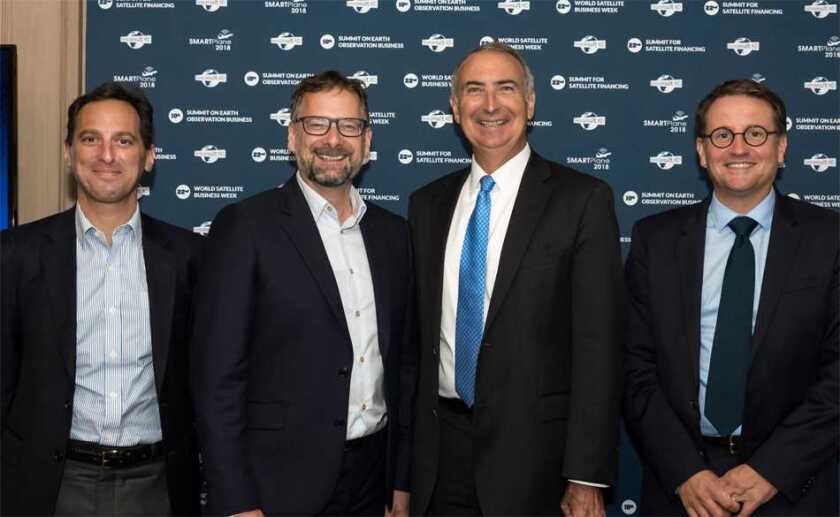Telesat, SES, Intelsat and Eutelsat formed the new C-Band Alliance (CBA) in response to an initiative from the Federal Communications Commission (FCC), which is discussing opening up some of their frequencies for 5G services.
They want to set up a trading system for the spectrum. The alliance states: “The CBA will engage in secondary market-based transactions to expand use of C-band.”
The agreement to set up the CBA was approved by Daniel Goldberg, Telesat; Steve Collar, SES; Stephen Spengler, Intelsat; and Rodolphe Belmer, Eutelsat (all pictured, in that order).
C-band, as defined by the Institute of Electrical and Electronics Engineers, includes the frequencies 3,700 to 4,200MHz for satellite downlinks – the exact band that the FCC and mobile operators have their eye on for some future 5G services. C-band satellite operators also use 5,925 to 6,425MHz for uplinks.
The CBA said it is “designed to act as a facilitator” for the FCC’s proposal to clear part of the spectrum so it can be shared with mobile operators. The four companies, normally rivals, said: “The formation of the CBA is a significant achievement and demonstrates the industry alignment necessary to make this mid-band spectrum available quickly, thus supporting the US objective of winning the race to introduce terrestrial 5G services.”
Mobile operators will also have to contend with the US Navy, which also uses part of the 3,700 to 4,200MHz spectrum for some of its missile-detecting radar systems.
The FCC wants to set up “a commercial and technical framework that would enable terrestrial mobile operators to quickly access spectrum in a portion of the 3,700 to 4,200 MHz frequency band in the US, speeding the deployment of next-generation 5G services,” said the CBA.
The FCC proposal “reflects the unique US telecommunications environment and aims to protect the quality and reliability of the extensive services provided by satellite operators in the C-band spectrum to US broadcasters, media and data companies”.
The FCC required the satellite industry to set up the consortium in order “to undertake the technical and commercial implementation of the spectrum clearing process”.
Bill Tolpegin, CEO of independent US TV company OTA Broadcasting, will be CEO of the CBA. Preston Padden, a former president of the ABC Television Network, will be head of advocacy and government relations.
Meanwhile the mobile industry has set up its own lobbying and negotiating group, the Citizens Broadband Radio Service (CBRS) Alliance, with 105 members, including all the US mobile operators, plus vendors such as Cisco, Ericsson and Nokia, and tower and infrastructure companies.
At the same time there is the Dynamic Spectrum Alliance (DSA), a more globally focused group, that includes Amazon, Facebook, Google and Microsoft among its charter members, and Comcast, Sky and Ruckus among so-called “promoter members”.
Kalpak Gude, president of the DSA, told Capacity before the satellite operators announced the CBA, that he questioned the right of the satellite companies to sell some of their spectrum.
“Do they have the right to sell? Why would they have the right to the money?” The satellite companies did not buy the spectrum, he pointed out, but were awarded it by governments and regulators in the early days of satellite operations.










